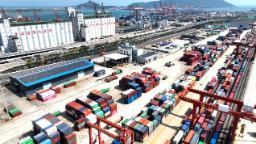
Hong Kong
CNN
—
Economic activity in China appeared to improve in August, with data released on Friday suggesting a downturn in growth may be stabilizing.
Industrial production — which measures output from sectors such as manufacturing and mining — rose 4.5% in August from a year earlier, gaining from the 3.7% increase seen in July, according to the National Bureau of Statistics. The outcome beat the expectations of a group of economists polled by Reuters.
Retail sales, which measures consumption, expanded by 4.6% from a year earlier, compared to the tepid 2.5% increase reported in July.
Investment in fixed assets such as property or real estate grew by 3.2% in the first eight months of this year from the same period a year ago, compared to the 3.4% in the first seven months of 2023 reported in August.
Larry Hu, chief economist for Greater China at Macquarie Group, said despite “widespread pessimism,” the worst may be over for the world’s second largest economy, which is currently grappling with weak export demand from global markets and an ongoing property crisis.
“If history is any guide, after the economy bottomed in [2016], policymakers still stepped up major stimulus measures from then on,” Hu wrote in a Monday research note. “Exports are also likely to improve for the rest of the year.”
Asian stock markets rallied following the release of the data, with the MSCI’s broad index of regional shares up nearly 1% by midday trade. In Hong Kong, the Hang Seng Index rose by 1.5%. Japan’s Topix was 0.8% higher.
“There’s a growing sense of optimism among a cohort of investors who believe that Beijing’s recent initiatives to stimulate the economy and stabilize financial markets are showing signs of success,” Stephen Innes, managing partner at SPI Asset Management, wrote in a Friday research note.
“However, it’s essential to exercise caution, as it’s still early in this process, and a single month of positive data isn’t sufficient to confirm a sustained path to recovery,” he added.
China’s economy has been in doldrums since April, when momentum from a strong start to the year faded. Since then, the government has introduced a flurry of measures to reignite growth.
On Thursday, the People’s Bank of China (PBOC) made a surprise cut to the amount of money that banks must keep in reserve, in order to support economic recovery and improve liquidity in the financial system.
The reserve requirement ratio (RRR) will be cut by 25 basis points for all banks starting Friday, except those that have already implemented a 5% reserve ratio. The PBOC last cut the reserve requirement ratio for almost all banks by 25 basis points in March.
The slowdown in China’s economy has invited concern at home and abroad.
On Tuesday, China’s Foreign Ministry spokesperson Mao Ning hit back at suggestions of economic weakness, saying growth was “strong and resilient.”
“All sorts of comments predicting the collapse of China’s economy keep surfacing every now and then. But what has collapsed is such rhetoric, not China’s economy,” she told reporters during a news conference. “China’s economy will remain a major engine for the global economy.”
The latest batch of economic data has been mixed.
On Saturday, the consumer price index was up just 0.1% in August — which was below market expectations, even as it edged into positive territory. The producer price index fell by 3% year on year, down for an 11th month in a row, as prices remained weak in the industrial sector.
The listless trend in China’s consumer prices is a major contrast with inflation seen in most other major economies, which have forced their central banks to increase interest rates.